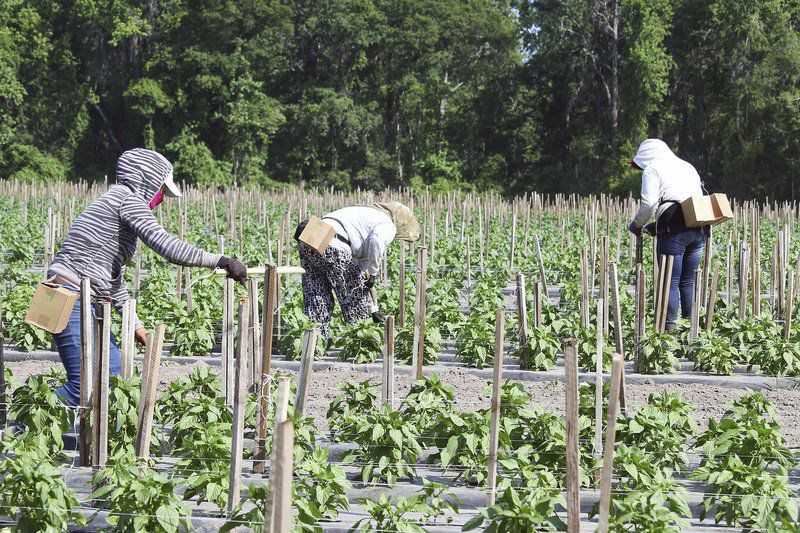UPDATE: Pause on H-2A visas due to coronavirus sparks concern of ag labor shortage
Published 1:45 pm Monday, March 23, 2020

- Derrek Vaughn | TheValdosta Daily Times Migrant workers are seen in a Lowndes County field.
ATLANTA — Georgia farmers are bracing for a potential labor shortage as harvest season approaches after the federal government decided to limit foreign workers in an effort to prevent COVID-19 spread.
The state’s fruit and vegetable producers are highly dependent on workers through the H-2A guest worker program — a federal program that brings migrant workers from neighboring countries seasonally to work in U.S. agriculture.
Citing domestic labor shortages, Georgia agriculture leaders have been pushing for a new updated program with more flexibility, but now with restrictions amid the global pandemic, even the current system is facing limitations.
To reduce virus transmission, as of last week, interviews in the approval process for new foreign worker visas in Mexico are being put completely on hold. Only guest workers who have previously worked in the U.S. under the program can be granted waivers.
Georgia is the nation’s highest user of the program. During fiscal year 2019, the Peach State surpassed all others, with 12% of the total workforce coming out of the H-2A program, according to the federal Office of Foreign Labor Certification. Nationwide in fiscal year 2018, 242,000 seasonal foreign workers were approved for hire.
A “justified uproar” came from farmers across the country when word first came out that the visa program was going to be halted altogether, Georgia Department of Agriculture Commissioner Gary Black told CNHI.
“It was 100% a direct emotional impact,” he said. “For farmers, the overriding concern is: are they going to have enough workers and will they arrive on time.”
Black said he immediately contacted U.S. Secretary of Agriculture Sonny Perdue’s staff who have given him assurance that concern had already been relayed to Vice President Mike Pence’s coronavirus task force.
Some relief came with clarification that returning workers would not face obstacles, Black said. But the issue remains that new workers are blocked from helping Georgia farmers with spring harvest.
“(Federal officials) know very well know the central nature of agriculture,” Black said. “This important time as spring harvest begins, they know that’s critical. I have every expectation that they’re going to do every time they possibly can.”
Charles Hall, executive director of the Georgia Fruit and Vegetable Growers Association, said that the program faces different challenges every year. Hall said producers were prepared for workers to be held at the border for officials to confirm their documentation.
“That’s what we thought was gonna be our challenge this year, is making sure that if we had workers stopped at the border we had resources in place to try to get them on through,” Hall said. “But it’s certainly larger than that now. It’s the overall issue of allowing the workers to come in because of the virus and how do we handle that.”
If need for labor goes unfilled by the program, he said, “there will be crops in the field that can’t get harvested.”
Rep. Sam Watson, R-Moultrie, said with Georgia having the largest number of employers leveraging the program in the country, usually he gets dozens of calls from farmers having trouble getting workers across the border.
“The fact that we have difficulty in a normal year just is makes this even more nerve-racking,” he said.
With spring harvest closing in, Watson said, “we’re in a critical time.”
Bill Brim, CEO of Lewis Taylor Farms in Tifton, said about 80% of the guest workers that come to his farm are new employees that under the federal restrictions, wouldn’t be allowed to come into the U.S.
Lewis Taylor Farms is one of the largest employers in Tift County and one of the largest operations of its kind in the Southeast. The farm encompasses 7,000 acres of produce such as squash, eggplant, cucumbers, bell peppers, specialty peppers, strawberries, a variety of greens, broccoli and melons.
Out of about 715 employees, Brim said, 500 are contracted migrant workers through the H-2A program.
Now, he’s scrambling to re-do paperwork to request returning workers. Brim said he does not suspect he will have enough workers for harvest.
“We’re trying to harvest a crop to feed this country,” he said, “and they’re making it harder on us.”





